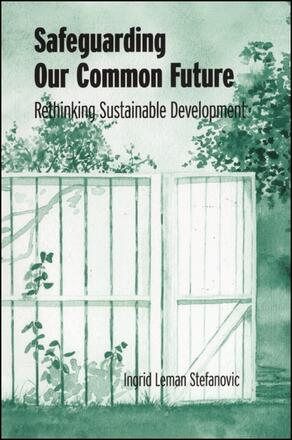
Safeguarding Our Common Future
Rethinking Sustainable Development
Utilizes Heidegger in rethinking common environmental paradigms.
Description
This book examines how a phenomenological approach helps move us closer toward safeguarding our common future by evolving a more originative and informed way of thinking about the foundations of sustainable development. Phenomenology, as conceived by Heidegger, enlarges and deepens our ways of thinking about sustainable development and offers a unique methodology of environmental policy development and planning.
Ingrid Leman Stefanovic is Associate Professor in the Department of Philosophy at the University of Toronto. She is the author of The Event of Death: A Phenomenological Enquiry and coeditor of Great Lakes Megalopolis: From Civilizations to Ecumenization, with Alexander B. Leman.
Reviews
"…Stefanovic has written a fascinating study, especially for those who are not yet satisfied with the ideas, policies, and projects that currently define sustainable development. " — Environment
"…useful, provocative, and stimulating … Its major contribution is showing how the undoing and redoing of 'originative thinking' informs specific projects in 'sustainability' … an admirable work, one of a kind. " — Environmental and Architectural Phenomenology Newsletter
"There is no topic more important to the task of leaving to our descendents a fit natural environment than that of sustainable development. This book deals usefully, originally, and importantly with this issue, and it should be read by anyone undertaking to think seriously about how to provide our progeny with a world they can receive as a blessing rather than a curse. " — Bruce V. Foltz, author of Inhabiting the Earth: Heidegger, Environmental Ethics, and the Metaphysics of Nature
"This book shows the relevance of the phenomenological tradition of philosophy to contemporary cultural concerns, with particular reference to questions surrounding environmental ethics and sustainable development. Books such as this, which strive to bridge disciplinary boundaries, are critical to the future of philosophy. " — Robert Frodeman, author of Earth Matters: The Earth Sciences, Philosophy, and the Claims of Community
"The first wave of enthusiasm for sustainability is over, and we are well into the second with debunking of the approach. With this comes both a loss of public and scholarly interest and the need for more careful thinking—with very little of the latter actually appearing on the scene. I believe this book will be one of the first to fit that bill. " — Robert Mugerauer, author of Interpretations on Behalf of Place: Environmental Displacements and Alternative Responses